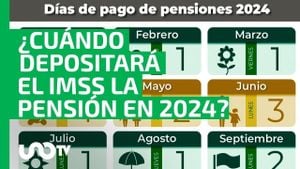On February 25, 2025, South Korea's central bank made the pivotal decision to lower its key interest rate from 3.00% to 2.75%, reducing it by 0.25 percentage points. This marks the first time the rate has fallen below 3% since October 2022, indicating significant economic policy adjustments amid growing concerns over domestic economic growth.
The monetary policy committee of the Bank of Korea (BOK) convened at its headquarters on Namdaemun-ro, Seoul, where they deliberated on the pressing economic circumstances leading to this decision. South Korea's economic growth outlook has been revised downward, now projected at 1.5% for the year, down from 1.9% as previously estimated. Such adjustments reflect the persistent fears of economic stagnation and the necessity for bolstering domestic demand.
According to the BOK, the decision to lower interest rates is primarily aimed at combating the rising risks of slow economic growth. This stance was evidently highlighted by BOK Governor Lee Jang-yong, who acknowledged the widening gap between South Korean and U.S. interest rates could impose additional burdens on the economy. "The decision to lower the rate reflects the growing risks of economic slowdown," reported The Korea Herald. The BOK's move is considered necessary to fuel economic activities, particularly as both consumer spending and investments show signs of wavering.
The rate cut follows previous adjustments, where the BOK lowered rates consecutively from 3.50% to 3.25% last October and has since aimed for gradual easing to support recovery. Remarkably, the monetary policy shift aligns with the increasing pressures on the market, fuelled by external uncertainties and the effects stemming from the international economic environment. The export sector, which is pivotal to South Korea's economy, continues facing challenges, raising doubts about its ability to sustain previous growth rates.
This interest rate change is projected to have multifaceted consequences across various sectors. Analysts anticipate improvements in consumer confidence as borrowing costs decline, potentially leading to revived spending and greater household investments. Sector specialists assert the reduction might stimulate the housing market as well, making mortgage rates more favorable for buyers.
Nonetheless, this strategic move is not without concerns. With the interest rate gap now widened to 1.75 percentage points compared to the United States, experts express apprehensions about possible repercussions, including inflationary pressures and the attractiveness of investments within South Korea. "The widening gap between U.S. interest rates and South Korean rates may have repercussions for the economy," noted Governor Lee Jang-yong. The uncertainty surrounding external funding flows could add strain, particularly if foreign investors recalibrate their positions due to these changes.
Insufficient domestic demand coupled with the backdrop of inflation rates maintaining relatively high levels complicates the situation. The BOK has cautiously held the consumer price inflation projection steady at 1.9% for both this year and next, illustrating their intent to balance stimulating growth without igniting rampant inflation. Experts have issued warnings, noting, "High inflation and potential foreign capital outflow present significant risks following the recent rate cut," as underscored by various financial analysts.
Despite these concerns, the Bank of Korea's recent action reflects its proactive approach to steer the economy back on the path of recovery by lowering borrowing costs. With growing uncertainties within the domestic economic environment, the BOK’s decision serves as both a cautionary tale and as measured optimism for the future. Consequently, stakeholders—from consumers to investors—will closely monitor the economy's responses to this latest policy change.
Moving forward, all eyes will be on the economic indicators stemming from this adjustment. The BOK will need to remain vigilant, addressing any emergent issues related to inflation and market stability. The road to economic recovery may be long, but this interest rate cut marks yet another step taken by South Korea’s central bank to strive toward revitalizing its economy amid domestic challenges.



